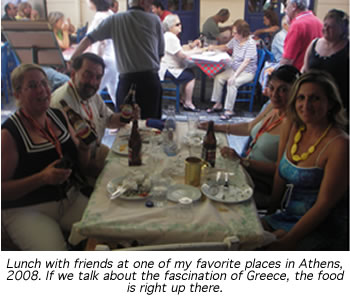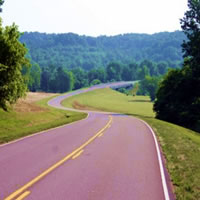The first time I went to Greece was in 1997.
I had decided to see a bit of Europe after spending some months on the island of Ibiza.
As things were, I had picked up a German copy of Henry Miller’s “The Colossus of Maroussi” a book that I still keep albeit in a rather wretched state.
I am telling this story to illustrate how powerful travel writing really can and should be, because that book singlehandedly sent me to Greece.
Writing that takes you places; literally
I remember I was at a hotel lobby in Paris and having just met the most delightful Greek boy, who was inviting me to hop on a train with him and his friends to Amsterdam, I HAD to say no – I had read the book, I had to see Greece with my own eyes.
If you ask me now what I remember about that momentous book which makes you “love the Greece” in the Paris Greek boy´s heavily accented words, I would honestly have to say that I don’t remember much.
One thing I do know is that Miller, as passionate a writer as he always was, totally succeeded in conveying the utter fascination of Greece and Greek people in his eyes, and that the most compelling thing about the book was that fascination in itself, rather than the actual people and places he was describing.

I believe that Miller teaches an important lesson for every serious travel writer – and I am not referring to those who just glue ad links together and throw in a random photo of themselves in whichever exotic surroundings – I mean people who have the aspiration to become writers who can make their readers travel with the flight of their words.
Get off the main road
Each one of you aspiring travel writers out there should aim at creating a certain mystique about the places you loved.
Go beyond the touristy places that you find on the guidebooks. Get to meet real people on the streets, the “randoms” as my travel-savvy friend Nancy would call them. If I had had my way and if I hadn’t been, on many occasions, getting paid to write about destinations, all my articles would have been about out-of-the-way places, unusual experiences, and meeting “randoms.”
Everyone has written about the Trevi fountain, but how about that eccentric bartender you met one night at a bar on the banks of the Tiber river? What about that little alley that mysteriously reminded you of a street in your hometown, or the colors and the sounds of a Rome sunset from the top of one of the seven hills?
My advice to you is this: write about something that only you could have experienced. This is what is going to make your writing unique and original. Write with passion. Choose your topics well; don’t write about something that didn’t make a profound impression on you, because it is very unlikely that it will make an impression on anyone else.
So. there it is. That is my first piece of advice; write with passion like Miller, create mystique, write evocative narratives, find what is really magic and unique about a place in terms of your own experience, and share it with the rest of the world. If you take them along with you on this fantastic adventure, they will always be thankful, and they will come back for more.
Down with stale phrases
My second piece of advice is equally central to compelling travel writing and equally hard to achieve: choose each one of your words with utmost care like Orwell. Do not go back to stale phrases and metaphors which, as Orwell would put it, have been repeated so often that they had lost all meaning.
If these new words don’t come easy to you, you will need to evoke the emotions and the perceptions of your senses at the time when your story was taking place. Each moment, each experience has its own unique resonance for each individual. You just need to find the words to express yours. If you find them, your reader will get to experience things through your eyes as closely as possible and the read will be a true experience for them.
Stale phrases of the kind Orwell despised are extremely common in descriptions. When I come up with a phrase to describe something, sometimes I Google the phrase. When I find that the there are zero search results for the phrase, that puts a smile on my face. How many times have you read phrases like “purple sunset” or “beautiful as a flower”? It is time to find your own words, there is one set of words that will come the closest to express how a sunset impressed you personally, and it is your job as writer to find them.
Practice makes perfect
I have three more pieces of advice for you: Read, Read, Read. The only way to work on your writing skills is to read great writers, and it is second only to the other threefold advice that writers must live by: Write, Write, Write. Reading great writers is the best way to improve your style and expand your vocabulary and your possibilities as a writer, and writing constantly is the only way to put what you are learning into practice.
It is a very enriching experience for a travel writer to read novels set in foreign lands, which record the impressions of a foreigner arriving at an exotic place. There are so many great writers who have written stories like this, that you will never run out of books to read.
When you are ready, with all your passion in full gear, your pen trained from constant writing, your brain full of ideas from constant reading, the impressions of your trip still fresh in your mind; just get down to it, and remember: always finish on a high note. If you make readers curious with your opening lines, give them some substance in the middle section of your text, and create a certain longing in your last lines, leaving readers alone with their thoughts to ponder about that mythical, fascinating place, then your job will be done.
~ Veronica
What piece of travel writing inspired you to travel? Share your experience!






Great advice on so many fronts. Occasionally I still edit travel writer articles and often come across those words and phrase that just make me shudder!
The azure blue waters…there have to be other words to use that tell me more about the water. Powder white sands…sure they are white but what else is significant about them?
Thanks for a great article. Now we need all the writers to read it!
Dear Wendy,
Thanks for your message! Get those writers down here and let´s fire up the discussion! I believe it is important for all of us to talk about these things.
Good luck with your work,
Veronica
.-= Veronica´s last blog post: Pamukkale- pictures from the map of imagination =-.
This post gets me all fired up about being a writer, woot! Awesome advice.
.-= Candice´s last blog post: How to Lose Yourself- The REAL Guide =-.
It is music to my ears to find out I inspired you!
I am honored.
I will be checking you out!
Good luck,
Veronica
.-= Veronica´s last blog post: Pamukkale- pictures from the map of imagination =-.
Great article, Veronica! It makes me a bit nervous now, as my first ever travel book will come out soon and I hope I have done it right. It would be so great if people got inspired by my words and started travelling the way I did. Will have to wait and see. :)
.-= Maria Staal´s last blog post: A New Title For My Book! =-.
Hi Maria,
How exciting!
Congratulations and good luck!
Thanks for the kind words.
I look forward to learning more about your book.
Best,
V
.-= Veronica´s last blog post: Pamukkale- pictures from the map of imagination =-.
Thanks for reminding me to have passion. I think my writing has been lacking in that lately. I seem to just be writing about the facts and yet I am passionate, I have just been lazy:-)
.-= Dave and Deb´s last blog post: Events with Canada’s Adventure Couple =-.